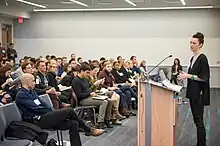
Suzanne Lee (born 1970)[1][2] is a Brooklyn, New York based fashion designer working on fashion and future technologies.
She is a Senior Research Fellow at Central Saint Martins College of Art and Design, the Director of The BioCouture Research Project, and Chief Creative Officer at Modern Meadow.
Her recent Arts and Humanities Research Council (AHRC) funded project BioCouture looks at ecological and sustainability issues surrounding fashion. She is working with scientists to engineer optimized organisms for growing future consumer products.
In 2007 she published Fashioning the Future: Tomorrow's Wardrobe. The book examines the work of the scientific researchers and fashion designers, such as Issey Miyake, Hussein Chalayan, and Walter Van Beirendonck, who are transforming today's science fiction into tomorrow's reality.
BioCouture

BioCouture is a research project using nature to suggest an innovative future fashion vision. Suzanne Lee uses microbial cellulose (composed of millions of tiny bacteria grown in bathtubs of sweet green tea) to produce clothing. The idea is to grow a dress in a vat of liquid.[3]
The project used a kombucha culture, which from feeding bacteria with sugar creates cellulose fibers, which naturally self-assemble to form a non-woven sheet material. [4]
After 20 years, Lee is now advising startups that are copying the Biocouture process and getting funded.[4] BioCouture has been included in Time Magazine's annual roundup of The Top 50 Best Inventions of 2010.[5]
BioFabricate
Lee founded BioFabricate in 2014 to work at the intersection of design, biology and sustainability. They host the annual conference BioFabricate Summit where businesses that biotechnology to develop material, fashion and clothing present work.[6]

In an interview with WIPO Magazine, Suzanne Lee explained that biofabrication involves utilizing microorganisms to create materials and ingredients for human use, such as fuel, food, and fibers.[4] Lee envisions these organisms as the cell factories of the future, providing high-value ingredients without depleting precious land resources: "The ultimate goal is to bring individuals together to use biomaterials for consumer goods and grow the sector."[4]
Biofabricate's current activities include building an educational platform for brands to learn about biomaterials, creating a reference book for creative professionals, and collaborating with global brands on their biomaterial innovation strategies. [4]
References
- ↑ Venkataramanan, Madhumita (2 January 2014). "Biocouture from the lab to the high street". Wired.co.uk.
Lee, 43
- ↑ Grose, Jessica (4 March 2014). "Making Clothes from Microbes". mental floss.
Lee, 44
- ↑ "BioCouture official website". BioCouture.co.uk.
- 1 2 3 4 5 "Designing with life: Biofabricate's Suzanne Lee envisions a "new material world"". WIPO Magazine.
- ↑ Luscombe, Belinda (11 November 2010). "The 50 Best Inventions of 2010: Clothing - BioCouture". Time.
- ↑ "Synbio Blog PLOS". plos.org.
Further reading
- Suzanne Lee, "Fashioning the Future: Tomorrow's Wardrobe", Thames & Hudson, 2005
- Nicholas Jordan, "From teabags to T-shirts", The Australian, 30 May 2011
- Stefania Vourazeri, "V.O.W N°8 // BioCouture by Suzanne Lee", Yatzer, 25 February 2011
- Catherine Jewell, "Designing with life: Biofabricate's Suzanne Lee envisions a “new material world”", WIPO Magazine, May 2023
External links
- Suzanne Lee at TED
- Bio-Couture on Exposureroom, Video for the new Trash Fashion exhibition at the Science Museum (archived in 2011)